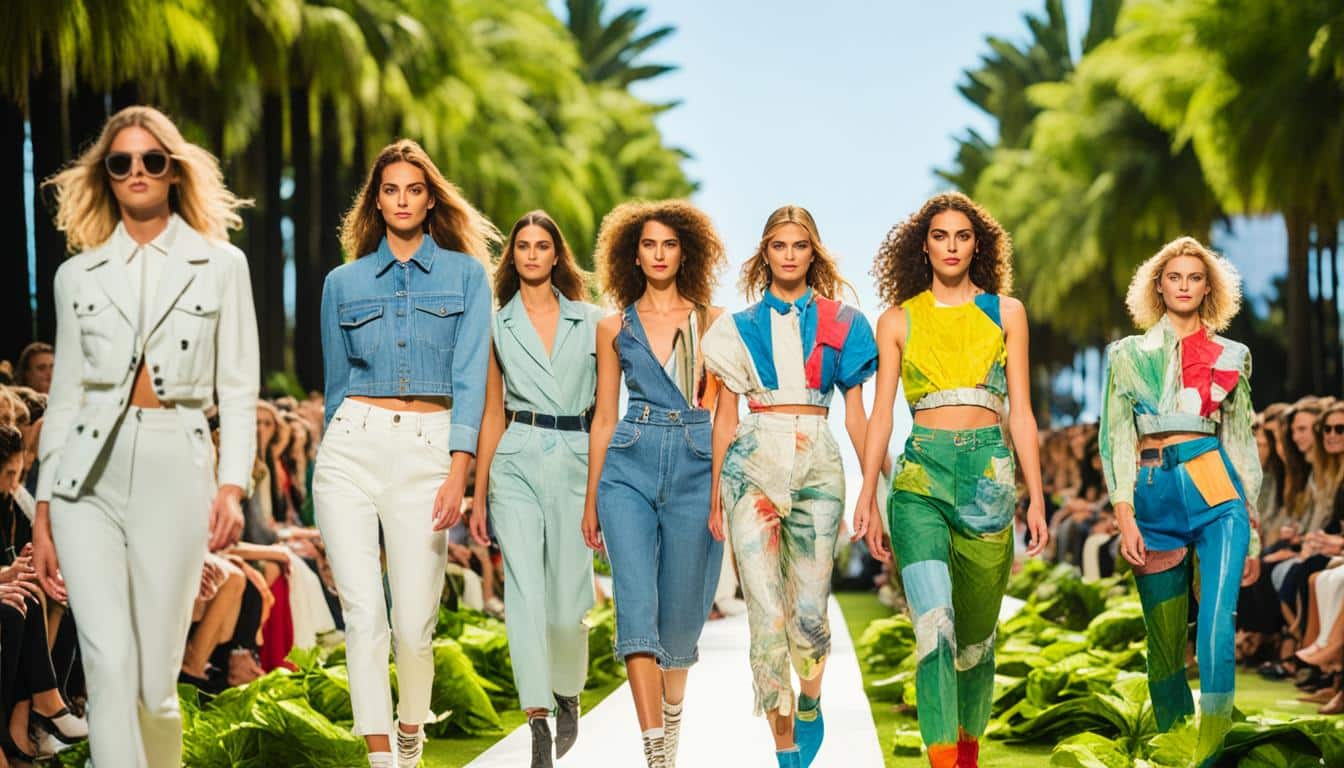How Sustainable Fashion Brands Are Changing The Style Game
Sustainable fashion has moved from being an afterthought to becoming the new norm in the fashion industry. The latest approach gaining popularity is Slow Fashion, which focuses on ethical and sustainable practices, prioritizing quality over quantity. This shift in mindset encourages us to invest in timeless pieces made with natural and recycled materials, resulting in an ethical wardrobe that is gentle on the environment.
Luxury brands such as Fendi and Stella McCartney are at the forefront of this movement, leading the charge towards responsible and transparent production. However, sustainability is not limited to high-end fashion; mainstream brands like Levi’s and Nike are also embracing eco-friendly practices.
Choosing sustainable fashion brands allows us to reduce waste and our carbon footprint, creating a better future for ourselves and the planet. By making conscious choices and supporting brands that prioritize ethics and sustainability, we can make a positive impact on the fashion industry and reshape the way we approach style.
Key Takeaways:
- Sustainable fashion is becoming the new normal, prioritizing ethical and sustainable practices.
- Slow Fashion encourages investing in timeless pieces made with natural and recycled materials.
- Luxury brands like Fendi and Stella McCartney, as well as mainstream brands like Levi’s and Nike, are embracing sustainability.
- Choosing sustainable fashion reduces waste and carbon footprint, creating a better future for ourselves and the planet.
- By supporting brands that prioritize ethics and sustainability, we can make a positive impact on the fashion industry.
Slow Fashion: Embracing Quality and Transparency
Slow Fashion is an ethical and sustainable approach to creating clothing that prioritizes the quality of the garment over the quantity. It encourages us to invest in timeless pieces made with sustainable and natural materials like organic cotton, wool, and recycled polyester. Slow Fashion brands also prioritize transparency in their production practices, allowing consumers to trace how their garments are made. This approach is not limited to luxury brands but is also embraced by mainstream brands like Levi’s and Nike, who are transitioning towards more sustainable and transparent practices.
By embracing Slow Fashion, we reject the fast-paced, mass-produced culture of the fashion industry and advocate for a more thoughtful and intentional approach. Quality over quantity becomes the guiding principle, as we seek out clothing that is designed to last and withstand the test of time. This means investing in well-made clothes that are not only durable but timeless in their design, ensuring they can be worn for years to come.
Transparency plays a crucial role in the Slow Fashion movement. It enables us to make informed decisions about the clothing we purchase, ensuring that it aligns with our values and meets our sustainability standards. Slow Fashion brands go beyond surface-level marketing claims and provide detailed information about their supply chains, manufacturing processes, and the materials used in their garments.
Slow Fashion is more than just a trend; it represents a shift in mindset and a commitment to conscious consumerism. It prompts us to consider the true cost of fashion and make choices that benefit both the environment and the people involved in the production process.
When it comes to materials, Slow Fashion brands prioritize sustainable options that minimize harm to the planet. Organic cotton, for example, is grown without the use of harmful pesticides and promotes soil fertility, making it a more eco-friendly choice than conventional cotton. Wool, a natural and renewable fiber, is biodegradable and can be recycled or composted at the end of its life. Recycled polyester, derived from post-consumer waste like plastic bottles, reduces reliance on virgin materials and helps combat plastic pollution.
The Impact of Slow Fashion
The Slow Fashion movement aims to challenge the throwaway culture perpetuated by fast fashion. It encourages consumers to be mindful of their fashion choices and embrace a more eco-friendly approach. By supporting Slow Fashion brands, we contribute to reducing waste and the carbon footprint associated with the fashion industry.
Furthermore, Slow Fashion promotes transparency within the fashion industry, holding brands accountable for their production practices. This transparency allows consumers to make well-informed decisions based on their values, supporting brands that prioritize ethical production, fair wages, and safe working conditions. By choosing Slow Fashion, we become agents of change, driving the industry towards a more sustainable and responsible future.
| Slow Fashion Benefits | Fast Fashion Drawbacks |
|---|---|
| Emphasizes quality over quantity | Promotes disposable clothing culture |
| Supports sustainable materials | Relies on non-renewable resources |
| Prioritizes transparency and ethical production | Opaque supply chains and exploitative labor practices |
| Reduces waste and carbon footprint | Generates excessive textile waste |
| Encourages conscious consumerism | Drives overconsumption and impulsive buying |
Mindful Fabric Choices: Sustainable Materials in Fashion
When it comes to embracing Slow Fashion and making sustainable choices, one of the key considerations is the fabric we choose for our clothing. Opting for sustainable and natural materials not only reduces our environmental impact but also ensures a more ethical and conscious approach to fashion. Let’s explore some of the sustainable fabric options that are gentle on the environment while still allowing us to express our personal style.
Natural Fabrics
One of the best ways to minimize the ecological footprint of our clothing is by selecting natural fabrics. These materials are derived from plants or animals and have a significantly lower impact compared to synthetic alternatives. Some popular natural fabrics include organic cotton, wool, and cashmere.
Organic cotton is grown without the use of pesticides or synthetic fertilizers, making it a more environmentally friendly choice. It promotes soil health, reduces water consumption, and supports sustainable farming practices in regions where cotton is cultivated.
Known for its durability, wool is a sustainable material that comes from sheep. It is biodegradable, renewable, and insulating, making it suitable for various types of clothing.
Cashmere is a luxurious and sustainable fabric derived from the soft undercoat of cashmere goats. Its long-lasting nature and natural insulation properties make it an ideal choice for timeless wardrobe pieces.
Recycled Polyester
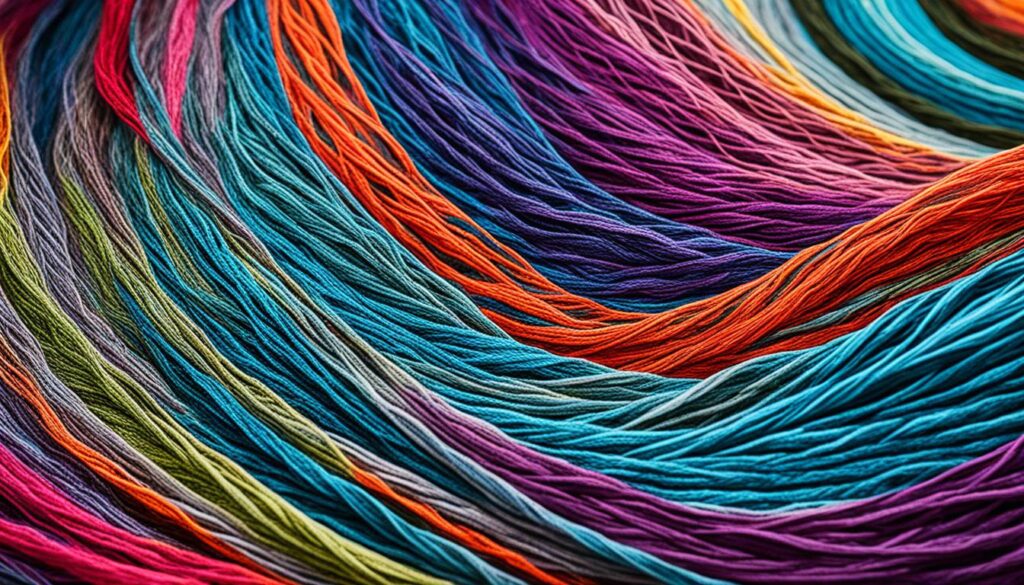
In addition to natural fabrics, recycled polyester is gaining popularity as an eco-friendly alternative to traditional polyester. It is made from recycled plastic bottles, diverting waste from landfills and reducing the demand for new petroleum-based fibers. Recycled polyester offers the same performance qualities as virgin polyester while minimizing the environmental impact.
Comparing the Sustainable Materials
| Material | Benefits |
|---|---|
| Organic Cotton | – Grown without pesticides – Reduces water consumption – Supports sustainable farming practices |
| Wool | – Durable and long-lasting – Biodegradable and renewable – Insulating properties |
| Cashmere | – Luxurious and timeless – Natural insulation properties – Sustainable production |
| Recycled Polyester | – Diverts plastic waste from landfills – Reduces demand for virgin petroleum-based fibers – Same performance as virgin polyester |
By consciously selecting sustainable materials like organic cotton, wool, cashmere, and recycled polyester, we can make a positive impact on the environment without compromising on style or quality. These choices allow us to build a wardrobe that aligns with our values, ensuring that every piece of clothing we wear tells a story of sustainability and conscious consumerism.
Uncovering Transparent Supply Chains
As conscientious buyers, it’s important to take an active interest in the manufacturing process and supply chains of our garments. By understanding how our clothes are made, we can make informed choices and support brands that prioritize ethical production and sustainability.
Slow Fashion brands are leading the way in creating transparent supply chains within the fashion industry. They are committed to ensuring that every step of the manufacturing process is ethical, transparent, and environmentally responsible. These brands use innovative technologies like QR codes and traceability methods to provide consumers with the ability to track the journey of their garments from raw materials to the finished product. This level of transparency allows consumers to make conscious decisions and hold brands accountable for their production practices.
Through transparent supply chains, we can gain insight into the working conditions of the people involved in the manufacturing process and verify that fair wages and safe working environments are provided. It also enables us to assess the environmental impact of production, such as the use of sustainable materials and the reduction of water and energy consumption.
“Transparency is essential in the fashion industry to ensure ethical production and environmentally responsible practices. By understanding the manufacturing process and supply chains, consumers can make conscious choices and support brands that align with their values.”
The Benefits of Transparent Supply Chains
1. Ethical Production: Transparent supply chains allow consumers to verify that their garments are produced in a socially responsible manner, ensuring fair wages and safe working conditions for all involved.
2. Environmental Responsibility: By tracking the manufacturing process, consumers can assess the environmental impact of their garments, such as the use of sustainable materials, reduction of waste, and the implementation of eco-friendly practices.
3. Consumer Empowerment: Transparent supply chains empower consumers to make informed decisions by providing them with the necessary information to align their purchases with their values. This transparency enables buyers to support brands that prioritize ethical production and sustainability.
Example of Transparent Supply Chains: Patagonia
Patagonia, a leading sustainable outdoor clothing brand, is a prime example of a company that values transparency within its supply chains. They provide a “Traceable Down Standard” that ensures their down products meet rigorous standards of animal welfare. Patagonia’s customers can access detailed information about the origins of the down used in their products, including the specific farm and country of origin. By sharing this information openly, Patagonia enables consumers to make informed choices and support a brand that aligns with their values.
Key Elements of Transparent Supply Chains
| Elements | Description |
|---|---|
| Traceability | Ability to track the journey of garments from raw materials to the finished product |
| Ethical Production | Ensuring fair wages, safe working conditions, and responsible treatment of workers |
| Sustainable Materials | Use of eco-friendly and responsibly sourced materials |
| Resource Efficiency | Reduction of waste, water consumption, and energy usage |
| Social and Environmental Impact | Assessment of the overall impact on communities and ecosystems |
By uncovering transparent supply chains, we can make conscious choices that have a positive impact on workers, the environment, and the fashion industry as a whole. Let’s continue to support brands that prioritize ethical production, traceability, and transparency within the fashion industry.
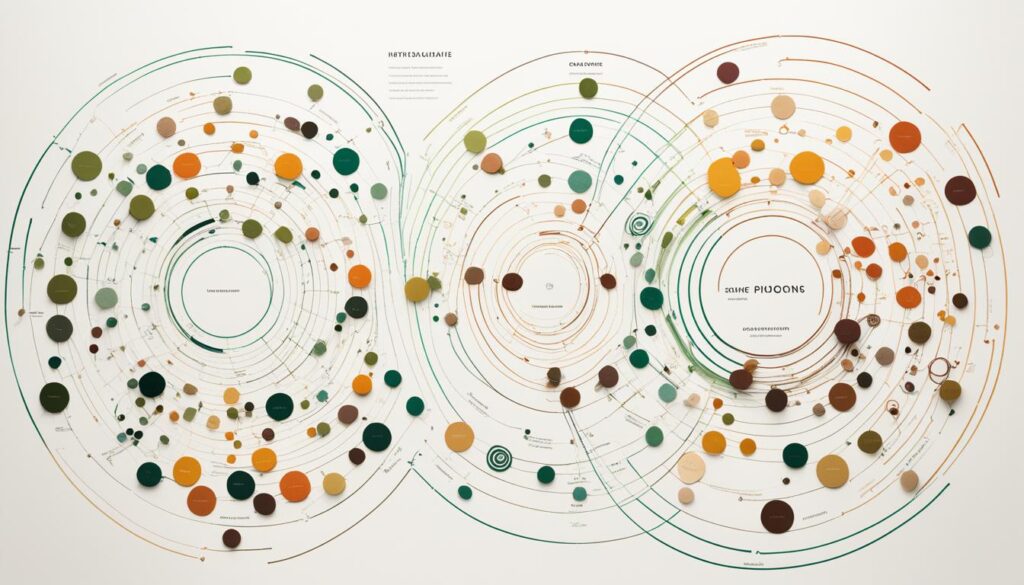
Sustainable Fashion Brands for Every Budget
Sustainable fashion is not limited to luxury brands. Many mainstream brands like Levi’s and Nike are also embracing sustainable practices and offering affordable options for consumers. By choosing to invest in sustainable fashion, we can support brands that prioritize ethics and sustainability, regardless of our budget. Whether you’re looking for high-fashion luxury brands or more budget-friendly options, there are sustainable fashion brands available for every price range.
When it comes to sustainable fashion, there are choices for everyone. Luxury brands like Stella McCartney and Fendi are leading the way in sustainable luxury fashion, offering high-quality and environmentally responsible clothing, accessories, and footwear. These brands combine style with sustainability, catering to consumers who seek both quality and ethics.
For those on a more moderate budget, mainstream brands like Levi’s and Nike have embraced sustainable practices and offer affordable options that don’t compromise on style or quality. These brands understand the growing demand for sustainable fashion and are committed to reducing their environmental impact.
Here are some popular sustainable fashion brands across different price ranges:
Luxury Brands
- Stella McCartney
- Fendi
- Patagonia
- Veja
Mainstream Brands
- Levi’s
- Nike
- Adidas
- H&M Conscious
These brands showcase that sustainable fashion is accessible to all and can fit any budget. By supporting sustainable fashion brands, we can contribute to a more sustainable and ethical fashion industry, promoting positive change for the environment and society.
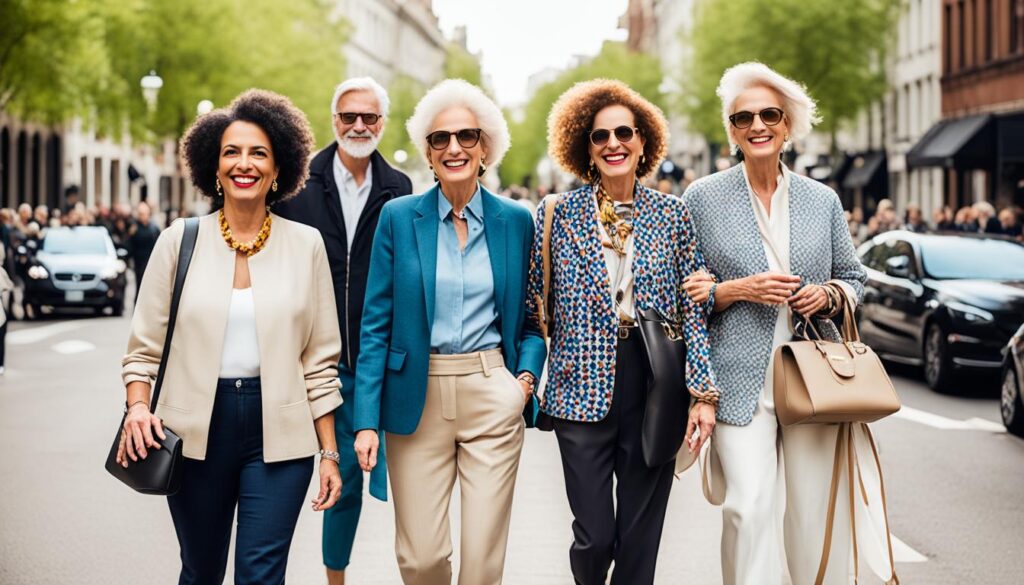
Quote:
“Sustainable fashion is no longer a privilege for the wealthy. Mainstream brands are stepping up and offering affordable options that prioritize ethics and sustainability.”
Ethical Fashion Brands Making a Difference
When it comes to ethical fashion, numerous brands are leading the way in making a positive impact in the industry. These brands not only prioritize sustainability but also embrace social responsibility and sustainable practices. By choosing to support these brands, consumers can make a conscious decision to contribute to a more sustainable fashion industry and a better world.
Outland Denim: Empowering Women and Sustainable Production
Outland Denim is an ethical fashion brand that goes beyond just creating stylish denim. They provide employment opportunities for women who have experienced sex trafficking, empowering them with fair wages, training, and a chance to rebuild their lives. In addition to their social impact, Outland Denim also prioritizes sustainable production practices. Their jeans are made from organic cotton, ensuring the use of eco-friendly materials, and they implement transparent supply chain processes to promote traceability.
DK Active: Stylish and Sustainable Activewear
DK Active, an Australian brand, offers a range of stylish and sustainable activewear that is perfect for those who care about their fashion choices and the environment. They use materials made from recycled plastics and post-consumer waste, reducing the demand for new resources and minimizing their carbon footprint. DK Active also prioritizes fair and ethical manufacturing practices, ensuring that their entire supply chain aligns with their commitment to sustainability.
Maggie Marilyn: Luxury Fashion with Sustainable Values
Maggie Marilyn is a luxury fashion brand that combines high-end aesthetics with sustainability. They use organic cotton and ethically produced silks in their collections, prioritizing natural and eco-friendly materials. By promoting transparency and traceability, Maggie Marilyn ensures that their garments are made in a responsible and ethical manner. Their commitment to sustainability extends beyond just their materials – it’s a core value integrated into every aspect of their brand.
Elk The Label: Independent and Sustainable
Elk The Label is an independent Australian brand that produces a wide range of clothing, accessories, jewelry, and home goods using sustainable materials. They prioritize eco-friendly practices and aim to minimize their impact on the environment. Elk The Label embraces slow fashion, creating timeless pieces that are made to last. With a focus on craftsmanship and sustainable sourcing, they demonstrate that ethical and sustainable fashion can be both stylish and impactful.

These ethical fashion brands are making a difference in the industry by showcasing that sustainable practices, social responsibility, and positive impact can go hand in hand with style and fashion. By supporting brands like Outland Denim, DK Active, Maggie Marilyn, and Elk The Label, consumers can make a conscious choice to contribute to a more sustainable and ethical fashion industry while embracing their personal style.
Luxury Meets Sustainability: Rothy’s and Girlfriend Collective
Rothy’s and Girlfriend Collective are two examples of sustainable fashion brands that seamlessly blend luxury and sustainability. These brands prioritize ethical production practices, transparency, and eco-friendly materials without compromising on style and quality.
Rothy’s:
“Rothy’s uses recycled water bottles to create stylish and eco-friendly shoes, bags, and accessories.”
Rothy’s is dedicated to sustainable practices throughout its entire production process. By transforming discarded plastic water bottles into fashionable products, they effectively reduce waste and promote environmental responsibility. Rothy’s also ensures a reduced carbon footprint by using sustainably sourced materials and eco-friendly packaging.
Girlfriend Collective:
“Girlfriend Collective focuses on ethical activewear made from recycled materials. They are transparent about their production processes and ensure that their clothing is ethically made.”
Girlfriend Collective sets a high standard for ethical production in the activewear industry. They use recycled materials like plastic bottles and reclaimed fishing nets to craft their products, reducing waste and promoting a circular economy. Through transparency, Girlfriend Collective gives consumers the opportunity to trace their clothing’s journey from sourcing to production, ensuring that each garment is made ethically.
Innovative Sustainable Practices
Rothy’s and Girlfriend Collective employ innovative methods to incorporate sustainability into their luxury fashion brands:
- Rothy’s uses 3D knitting technology to create shoes with minimal waste, making each pair precisely tailored without compromising on comfort.
- Girlfriend Collective partners with Fair Trade-certified factories and ensures fair wages and safe working conditions for garment workers.
- Both brands prioritize the use of non-toxic dyes and eco-friendly materials to minimize their environmental impact.
By combining luxury and sustainability, Rothy’s and Girlfriend Collective prove that fashion can be both high-quality and environmentally responsible.
Comparing Rothy’s and Girlfriend Collective
| Rothy’s | Girlfriend Collective |
|---|---|
| Uses recycled water bottles to create eco-friendly products | Focuses on ethical activewear made from recycled materials |
| Prioritizes sustainable production processes | Ensures transparency in production processes |
| Reduces carbon footprint through sustainable packaging | Traces clothing’s journey from sourcing to production |
Both Rothy’s and Girlfriend Collective offer consumers the opportunity to make conscious choices without compromising their love for luxury fashion. Through their sustainable practices and commitment to transparency, these brands inspire others in the industry to embrace a more ethical and eco-friendly approach.
Style and Sustainability: Tomorrow Denim and Rise & Fall
When it comes to sustainable fashion, style and sustainability can go hand in hand. Tomorrow Denim and Rise & Fall are two leading brands that prioritize both fashion-forward designs and eco-friendly practices.
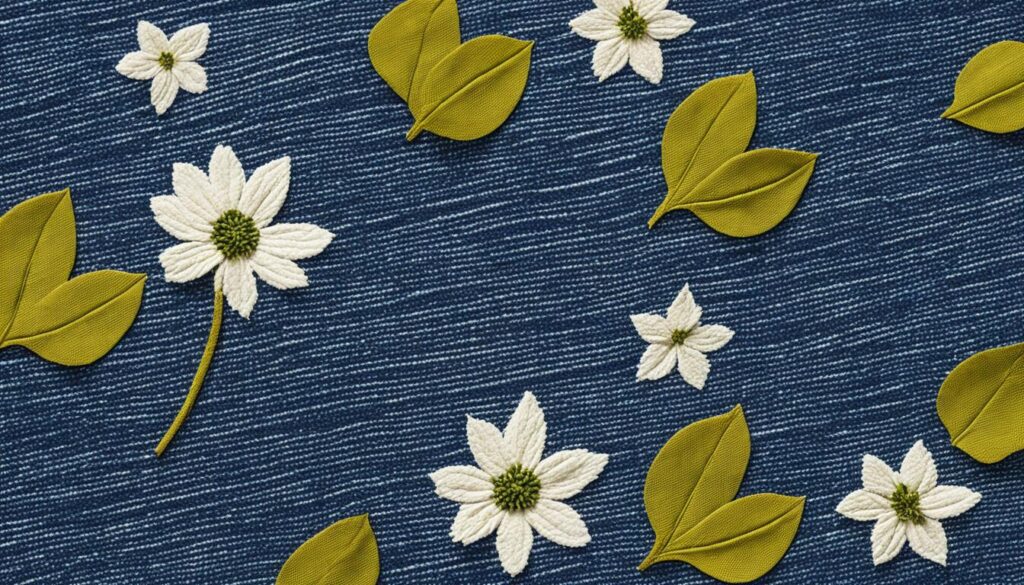
Tomorrow Denim: Well-Fitting Jeans with a Conscience
Tomorrow Denim is dedicated to creating well-fitting jeans that not only flatter your figure but also minimize their impact on the environment. These jeans are crafted using sustainable materials such as 100% cotton, pre-consumer recycled cotton, and recycled polyester, reducing the need for virgin resources and diverting waste from landfills. Tomorrow Denim is committed to transparency and traceability, ensuring that their production processes meet ethical standards and giving you peace of mind when purchasing their jeans.
Rise & Fall: Luxurious and Timeless Shirts
Rise & Fall takes a different approach to sustainability by focusing on creating luxurious and timeless shirts. Their commitment to using sustainable materials means that their shirts not only look good but also have a positive impact on the environment. Rise & Fall partners with manufacturers that prioritize sustainability and environmental responsibility, ensuring that their products are made with care and consideration. By choosing Rise & Fall, you can elevate your style while making a conscious choice towards a more eco-friendly fashion industry.
Both Tomorrow Denim and Rise & Fall prove that sustainable fashion doesn’t mean sacrificing style. With their commitment to ethical production and eco-friendly materials, they are paving the way for a more sustainable and fashionable future.
| Brand | Key Features |
|---|---|
| Tomorrow Denim |
|
| Rise & Fall |
|
Sustainable Fashion from Australia: MNK Atelier and Elk The Label
MNK Atelier and Elk The Label are two Australian fashion brands renowned for their commitment to sustainability and ethical practices. These brands exemplify the principles of slow fashion, focusing on longevity and the use of sustainable materials.
MNK Atelier is dedicated to the slow fashion movement, releasing carefully curated collections made from premium Japanese fabrics and organic and recycled materials. By prioritizing quality craftsmanship and timeless designs, MNK Atelier encourages conscious consumption and reduces the environmental impact of the fashion industry. With their sustainable approach, they redefine what it means to create stylish and eco-friendly garments.
Elk The Label, an independent family-owned brand, believes in the power of ethical production and sustainable materials. They produce a wide range of clothing, accessories, jewelry, and home goods that are thoughtfully made using sustainable materials. Elk The Label’s commitment to sustainability extends beyond their products; they actively work towards reducing waste and implementing sustainable practices throughout their supply chain.
These Australian fashion brands embody the essence of slow fashion and serve as role models in the industry’s pursuit of a greener, more sustainable future. Their dedication to using sustainable materials, transparency in production, and ethical practices sets them apart as leaders in the Australian fashion scene and beyond.
Image:
Sustainable Fashion Brands from Australia
| Brand | Key Features |
|---|---|
| MNK Atelier |
|
| Elk The Label |
|
Sustainable and Stylish: Mashu and Dear Frances
When it comes to luxury fashion brands that prioritize sustainability and ethical production, Mashu and Dear Frances are two names that stand out. Both brands offer a range of sustainable accessories that blend style seamlessly with eco-friendly practices. Let’s take a closer look at each brand and their commitment to creating a more sustainable future.
Mashu: Luxury Vegan Accessories
Mashu is renowned for its luxurious, vegan accessories that are not only aesthetically pleasing but also environmentally conscious. The brand utilizes innovative materials and production methods to create their stunning collection. From handbags to tote bags and wallets, Mashu proves that luxury fashion can be achieved without compromising the environment.
Also Read:- The Artistry Of Fashion Designers Make: Shaping Trends And Culture
Through careful craftsmanship and a dedication to sustainable practices, Mashu ensures that each accessory is made with the utmost respect for the planet. They prioritize using vegan leather alternatives that are cruelty-free and sustainable, such as Piñatex® made from pineapple leaf fibers and Mylo™ made from mushroom-based materials. By embracing these eco-friendly materials, Mashu sets an example for other luxury brands to follow in their footsteps.
Not only does Mashu use sustainable materials, but they also prioritize ethical production practices. They work with artisans who are paid fair wages and ensure safe working conditions throughout their supply chain. Mashu’s commitment to transparency and ethical values sets them apart in the luxury fashion industry.
Dear Frances: Mindfully Crafted Footwear
“We aim to bring the traditional luxury and quality of the best European shoemakers to our customers, but on our terms. We slow down the fashion cycle, promote socially conscious businesses, and craft shoes that are both ethically made and enduring in style.” – Jane Frances, Founder of Dear Frances
Dear Frances is a luxury footwear brand that takes a mindful approach to their design and production processes. They prioritize creating shoes that are not only fashionable but also have a positive impact on the environment and the people involved in their creation.
Dear Frances sources high-quality materials for their footwear, ensuring durability and longevity. They use sustainable materials such as chrome-free leather, recycled textiles, and natural rubber. By opting for these materials, they reduce their environmental footprint and contribute to a more sustainable fashion industry.
One of the key aspects that sets Dear Frances apart is their commitment to slowing down the fashion cycle. Instead of following fast fashion trends, the brand focuses on timeless designs that can be cherished for years to come. This approach reduces waste and promotes a more sustainable and conscious consumer mindset.
Dear Frances also emphasizes the importance of supporting socially conscious businesses. They work with skilled artisans who are paid fair wages and provide safe working conditions. By forging meaningful relationships with their suppliers, Dear Frances ensures that their production processes align with their ethical values.
Comparison Table: Mashu vs. Dear Frances
| Mashu | Dear Frances |
|---|---|
| Luxury vegan accessories | Mindfully crafted footwear |
| Uses materials like Piñatex® and Mylo™ | Chrome-free leather and recycled textiles |
| Transparent and ethical production practices | Supports socially conscious businesses |
| Stunning designs that blend style and sustainability | Timeless designs for enduring style |
As the table above highlights, both Mashu and Dear Frances excel in their commitment to sustainability and ethical production practices. While Mashu focuses on creating luxurious vegan accessories, Dear Frances crafts timeless footwear that is kind to both people and the planet. No matter which brand you choose, you can be confident that your purchase supports a more sustainable and stylish future.
Conclusion
Sustainable fashion brands are revolutionizing the fashion industry by prioritizing eco-friendly practices and ethical production. Whether you prefer luxury brands or mainstream options, there are sustainable fashion brands available for every budget and style preference. By investing in sustainable fashion, we not only contribute to a greener and more ethical wardrobe but also support brands that align with our values of sustainability and ethics.
Conscious consumerism plays a vital role in driving the demand for sustainable fashion. With an increasing number of informed consumers, the fashion industry is witnessing a shift towards a more responsible and stylish future. By choosing sustainable fashion brands, we can make a positive impact on the environment and the lives of the workers in the fashion supply chain.
From clothing to accessories, these brands are proof that sustainable fashion can be both fashionable and mindful of the planet. By being conscious of the materials used, the transparency of supply chains, and the ethical practices followed by these brands, we can embrace sustainable fashion as a long-term lifestyle choice. Let us join the movement towards a more sustainable and stylish future through conscious consumerism and the support of sustainable fashion brands.
FAQs
Q: What is Slow Fashion?
A: Slow Fashion is an ethical and sustainable approach to creating clothing that prioritizes the quality of the garment over the quantity. It encourages us to invest in timeless pieces made with sustainable and natural materials like organic cotton, wool, and recycled polyester. Slow Fashion brands also prioritize transparency in their production practices, allowing consumers to trace how their garments are made.
Q: Why should I choose sustainable materials in fashion?
A: Embracing sustainable materials in fashion, such as organic cotton, recycled polyester, and natural fabrics like wool and cashmere, can help reduce our carbon footprint and support a more eco-friendly approach. These materials are gentler on the environment compared to synthetic materials, contributing to a more sustainable fashion industry.
Q: How can I ensure ethical production in the fashion industry?
A: Seeking transparent supply chains and supporting brands that prioritize ethical production practices are key to ensuring ethical production in the fashion industry. Slow Fashion brands often emphasize transparency, allowing consumers to trace how their garments are made, from raw materials to the manufacturing process. By choosing brands that prioritize transparency, we can ensure that our purchases align with our ethical values.
Q: Are sustainable fashion brands only for luxury shoppers?
A: No, sustainable fashion brands are available for every budget. While luxury brands like Stella McCartney are leading the way in sustainable and ethical fashion, many mainstream brands like Levi’s and Nike are also embracing sustainability and offering affordable options for consumers. By choosing to invest in sustainable fashion, we can support brands that prioritize ethics and sustainability, regardless of our budget.
Q: Can you recommend any sustainable fashion brands that make a positive impact?
A: There are numerous ethical fashion brands that make a positive impact in the industry. Outland Denim provides employment opportunities for women who have experienced sex trafficking, while also prioritizing sustainable production practices. DK Active offers stylish and sustainable activewear, and Maggie Marilyn uses organic cotton and ethically produced silks in their luxury fashion line. Elk The Label is an independent Australian brand that produces sustainable clothing, accessories, jewelry, and home goods. These brands demonstrate that ethical and sustainable fashion can be stylish and make a positive impact.
Q: Are there any sustainable fashion brands that blend luxury and sustainability?
A: Rothy’s, known for their stylish and eco-friendly shoes, bags, and accessories, uses recycled water bottles to create their products. They prioritize sustainability in their production processes, ensuring a reduced carbon footprint. Girlfriend Collective focuses on ethical activewear made from recycled materials and is transparent about their production practices. Both brands seamlessly blend luxury and sustainability, offering high-quality and environmentally responsible fashion options.
Q: Are there any sustainable denim brands I can consider?
A: Tomorrow Denim creates well-fitting jeans using sustainable materials like 100% cotton, pre-consumer recycled cotton, and recycled polyester. They ensure transparency and traceability in their production processes, allowing consumers to know how their denim is made. Rise & Fall focuses on creating luxurious and timeless shirts using sustainable materials. They partner with manufacturers that prioritize sustainability and environmental responsibility. These brands offer stylish and eco-friendly options for denim enthusiasts.
Q: Are there any sustainable fashion brands from Australia?
A: MNK Atelier focuses on slow fashion and longevity, releasing thoughtfully curated collections made from premium Japanese fabrics and organic and recycled materials. Elk The Label is an independent family-owned brand that produces ethically made clothing, accessories, jewelry, and home goods using sustainable materials. These Australian brands demonstrate the country’s commitment to sustainable fashion and offer stylish and eco-friendly options.
Q: Are there any sustainable brands that focus on accessories?
A: Mashu creates vegan accessories that blend style seamlessly with sustainability. Their products offer luxury without compromising the environment. Dear Frances focuses on luxury footwear with a mindful approach, promoting socially conscious businesses and slowing down the fashion cycle. Both brands prove that sustainable fashion can be high-end, stylish, and environmentally responsible.
Q: How are sustainable fashion brands changing the style game?
A: Sustainable fashion brands are leading the way in transforming the fashion industry. From luxury brands to mainstream brands, there are options available for every budget and style preference. By investing in sustainable fashion, we can contribute to a greener and more ethical wardrobe while supporting brands that prioritize sustainability and ethics. With increasing awareness and a growing number of conscious consumers, sustainable fashion is no longer a trend but a movement towards a more responsible and stylish future.
Q: What is sustainable fashion?
A: Sustainable fashion refers to clothing that is produced and designed with consideration for the environment, social impact, and ethical treatment of workers. This includes using eco-friendly materials, fair trade practices, and ethical working conditions.
Q: Why is sustainable fashion important?
A: Sustainable fashion is important because it reduces the negative impact of the clothing industry on the environment and promotes ethical and fair working conditions for garment workers. It also encourages the use of eco-friendly materials and practices to reduce waste and pollution.
Q: How are sustainable fashion brands changing the style game?
A: Sustainable fashion brands are changing the style game by offering stylish and trendy clothing options that are produced in a sustainable and ethical manner. They are redefining what it means to be fashionable by incorporating eco-friendly materials and ethical practices into their designs.
Q: Can you recommend some sustainable clothing brands to shop from?
A: Absolutely! You can explore options from Stella McCartney, a renowned sustainable clothing brand known for its commitment to eco-friendly and ethical fashion. There are also many other brands like Patagonia, Reformation, and Everlane that are leading the way in sustainable fashion.
Q: What are some key features of sustainable clothing brands?
A: Sustainable clothing brands often use recycled fabrics, follow fair trade practices, and may be certified by organizations like GOTS for their use of organic materials. They also prioritize ethical and sustainable production methods, as well as transparency in their business model.
Q: How can I find more sustainable clothing brands to support?
A: You can discover sustainable clothing brands by looking for fair trade certification, B Corp status, or by researching brands that are known for their commitment to sustainability and ethical practices. Online platforms and curated lists can also guide you to find more sustainable options.
Q: What are some sustainable and ethical practices that clothing brands are adopting?
A: Some sustainable and ethical practices that clothing brands are adopting include using sustainable and recycled materials, ensuring fair trade certified production, and implementing ethical and eco-friendly practices throughout their supply chain. This includes offering sustainable loungewear options, ethical and eco-friendly clothing, and sustainable underwear collections.
Q: Is fast fashion compatible with sustainability?
A: Fast fashion is often associated with unsustainable and unethical practices due to its rapid production cycles, reliance on cheap labor, and high resource consumption. However, some fast fashion brands are making efforts towards sustainability, but their impact on the environment and workers is still a concern.
Q: What are some characteristics of ethical clothing brands?
A: Ethical clothing brands are known for prioritizing fair trade, using sustainable materials, adhering to ethical and eco-friendly practices, and being transparent about their business model. They also promote the well-being of workers and the environment as core values in their operations.
Q: How can I buy clothing in a more sustainable way?
A: You can buy clothing in a more sustainable way by supporting ethical and sustainable fashion brands, choosing items made from eco-friendly and recycled materials, considering the longevity and versatility of your purchases, and supporting fair trade and ethical practices in the fashion industry.
